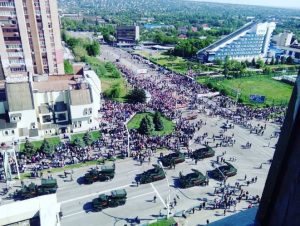
Since 2014, the Kremlin has consistently denied Russia’s leading role or even involvement in the ongoing war in the two easternmost regions of Ukraine, Donetsk and Luhansk, known collectively as the Donbas.
The Russian official narrative states that the war in Ukraine has been a mere internal conflict where local inhabitants had risen in rebellion against the nationalist Kyiv government, and established two states of their own.
Meanwhile, Kyiv maintains that the state-like formations in Luhansk and Donetsk (“LNR” and “DNR”) are Russian occupation administrations and that the entire conflict was initiated, fueled, controlled, supplied, and is sustained by Russia.
As the Kremlin remains in denial, Kyiv’s position has been backed by a lot of evidence discovered throughout the years of the conflict. Moreover, the EU, the US, and a number of the world’s other leading democracies had imposed sanctions on Russia not only for its annexation of Ukraine’s Crimean peninsula but also for Russia’s role in the Donbas war.
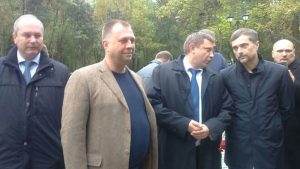
Now, MP Boroday’s revelations came in his interview with Zvezda Live, a Youtube channel linked to Russia’s Defense Ministry’s TV channel Zvezda.
Halya Coynash of the Kharkiv Human Rights Protection Group gives a vivid account of Borodai’s interview:
Early in the interview, Boroday juxtaposed Ukrainian Armed Forces to “our forces.” The interviewer asked “by ours you mean Donbas?” and he answered, “Yes, of course, they’re Russian people, Russian forces.” [interviewer] Fridrikhson, grinning, intervenes, telling Boroday to “be more careful” with language, as he’s now an MP.
Boroday didn’t back down, saying,
“Sure, sure. I think this is a crucial point. Here [i.e. Donbas] there were Russian forces, and there were the armed forces of the Russian Federation – also Russian forces. Both the first and the second are Russian forces. Yes, one lot are called corps of the DNR and LNR people’s militia, the others – corps of the Russian army. What’s the difference?”
Boroday’s career
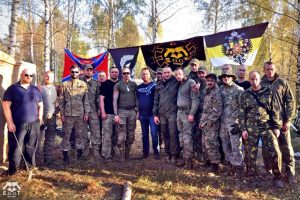
Aleksandr Boroday fought against Moldovan authorities as a volunteer fighter with the pro-Russian rebels in 1991. At that time, his father, a philosopher, authored disputed social theories and coined the term “Russian Spring” in the early 1990s. This term was later widely picked up by Russian actors in 2014 as a name for the Moscow-instigated pro-Russian insurgence in Ukraine.
Back in 2002, Russian media claimed that Moscow State University alumnus Aleksandr Boroday, ex-journalist of a Russian nationalist newspaper working as a “political technologist” and a business crisis manager at the time, was appointed a deputy director of the Russian security agency FSB. Boroday himself later rejected this claim as a hoax, however, admitted that for many he knew FSB officer Igor Girkin (“Strelkov”) who once boasted that it was he “who pulled the trigger of war” in the east of Ukraine.
- Read also: Who is who in the Kremlin proxy “Donetsk People’s Republic” (2017)
In mid-May 2014, Boroday, who had by them actively participated in the Russian annexation of Crimea and in pre-war Russian-instigated upheaval in Luhansk, was appointed the first “prime minister” of the so-called Donetsk People’s Republic (“DNR”) — the quasi-state formation run by the Russian-hybrid forces on the occupied part of Ukraine’s Donetsk Oblast.
His reign over Donetsk wasn’t long. On 24 July, just a week after Malaysia Airlines Flight 17 was shot down over the occupied territory, he set off back to Russia only to return another week later for declaring his resignation as “prime minister of the DNR.”
From 2015 to this day, Boroday leads the so-called Donbas Volunteers’ Union (DVU), a Moscow-based organization established to unite the Russian veterans who had fought against Ukraine in the Donbas.
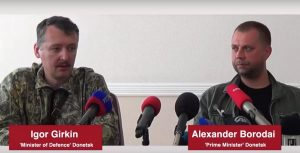
Now, Boroday is a newly-minted legislator of the State Duma, the lower house of the Federal Assembly of Russia. He won his seat in the recent scandalous Duma elections, condemned by major democracies as they once again took place on the Ukrainian peninsula of Crimea annexed by Russia back in 2014, which remains an integral part of Ukraine under international laws.
What is more, this time Russia also encouraged the inhabitants of occupied areas in Ukraine’s east, where the Kremlin has distributed allegedly hundreds of thousands of Russian passports, to vote remotely online or set for the polling stations in the adjacent Rostov Oblast of Russia.
Ironically, it was his standing on United Russia’s Rostov regional list that secured metropolitan Muscovite Boroday his seat in the Duma, where Putin’s party has won 324 seats out of the total of 450.
Another freshman Duma legislator linked to the Russian invasion of eastern Ukraine is writer Zakhar Prilepin, the former warlord in a Donetsk-based armed group and an adviser to “DNR head” Aleksandr Zakharchenko. Prilepin got one of the 27 seats won by the Fair Russia party.
Boroday’s earlier statements
Here are several examples of Aleksandr Boroday’s statements, controversial or challenging Russia’s official narratives, that he made in the previous years before he became a Russian MP.
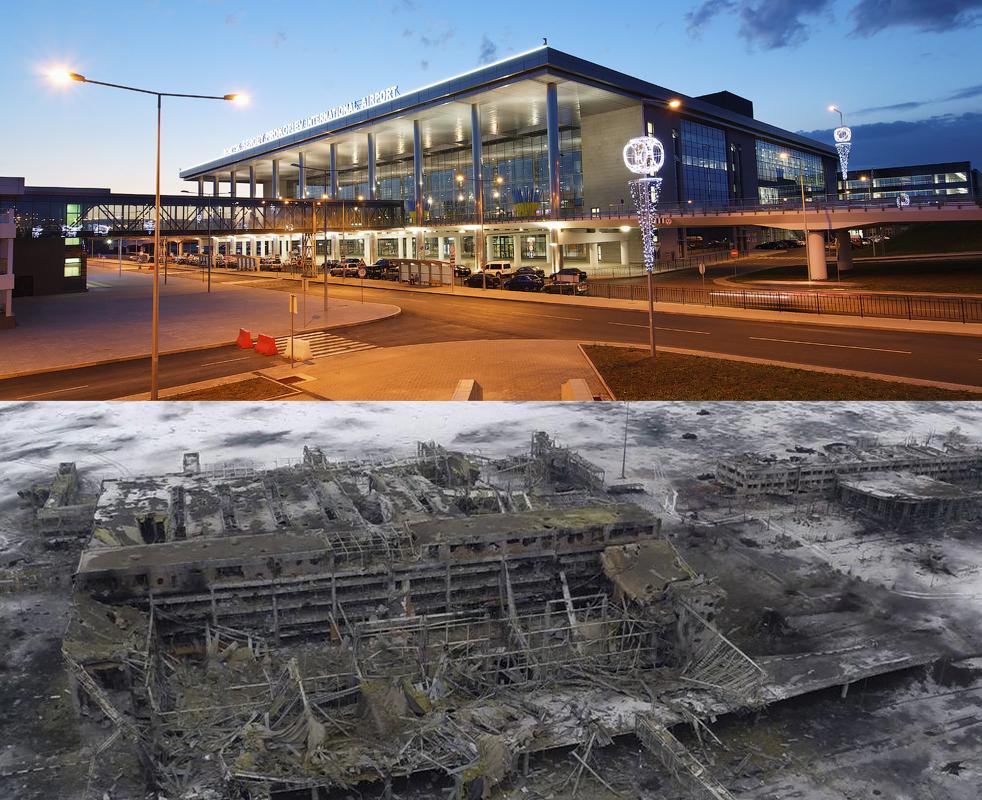
In May 2014 at an early stage of the Battle for Donetsk Airport, then “DNR PM” Boroday admitted the deaths of 34 “Russian volunteers” in action, whose dead bodies were sent back to Russia. Such confessions later became rare as officials of occupation administrations preferred to hide their battle losses.
In late 2014, Boroday admitted that the Russian project of Novorossiya aimed at breaking the entire south-eastern half off Ukraine to make it into a Russian protectorate failed,
“There is no Novorossiya. Of course, we all use this term, but it is a false start, to be honest. Novorossiya is an idea, a dream, so to speak. It is an idea that didn’t come true. It didn’t come true due to a number of objective conditions,” Boroday said in his comment to the Russian TV channel Den’.
He saw the seized Crimea and parts of Luhansk and Donetsk oblasts as jumping-off grounds “for creating a future Novorossia.”
- Read also: Nemtsov: Putin’s 9 failures and the death of the ‘Novorossiya’ project (2014)
In the same TV program, he also stated that he left the “DNR” mainly for political reasons,
“It was obvious that negotiations would begin after certain events. Of course, it was a bit ridiculous to conduct those negotiations [for me] as a citizen of Russia, a resident of Moscow,” Boroday said.
In summer 2015, asked by Gazeta.ru if he feels guilty about the crash of Flight MH17 which had occurred on 17 July 2014 during his tenure as “DNR prime minister,” Boroday rejected any guilt of his or of his entourage,
“I don’t feel guilty. I’m not saying that I’m not guilty of anything, that I’m sinless and have a halo around my head, but at least in this story with Boeing I don’t feel my slightest guilt. And my comrades’.”
Meanwhile, Boroday’s fellow “DNR minister” Igor Girkin is among four MH17 case defendants – “individuals who are thought to be responsible for the crash” – tried in absentia in the Netherlands. Evidence collected by the Joint Investigation Team of prosecutors suggests that those four were involved in bringing the Russian Buk-2 surface-to-air missile system into the launch position south of Donetsk from which it shot down the airliner killing all 298 passengers and crew aboard it.
Asked during his 2017 interview with the Russian TV channel Tsargrad how many Russians used to fight in the Donbas, Boroday replied,
“This figure isn’t classified. There are more than 11,000 members in the Donbas Volunteers’ Union alone. And these are only those people who took part with weapons in their hands in the Donbas events over the past years,” said he implying that this number doesn’t include the fighters who aren’t the members of DVU, the Russian regulars, and those who had their fingers in the Donbas pie in non-fighting roles.
Meanwhile, in his leaked non-public letter that he had sent to a bishop of the Russian Orthodox Church begging assistance to the Russian “volunteer veterans” of the Donbas war, he wrote that some 50,000 Russian citizens fought against Ukraine in 2014-2015.
In his 2017 interview with segodnia.ru, Aleksandr Boroday admitted that he “was resolving personnel matters” of the “DNR” long before the organization started to control parts of Ukrainian territory.
“Donetsk People’s Republic” ex-PM inadvertently admits he carried out Kremlin plans
In 2019, Boroday stated in his interview with the Russian TV channel Tsargrad that Russian warlord Arsen Pavlov (“Motorola”) assassinated in 2016 in Donetsk, wasn’t killed by Ukrainian special services, as claimed by Russian state media.
“The case with Motorola is specific because it belongs to the category of local infighting with local criminals, with the old-Donetsk (i.e. existing since pre-war times) ones, who, so to speak, don’t feel very comfortable in their current state in the ‘republics’,” he said.
Boroday’s revelations are hardly new for anybody who had been observing the extensive proof of Russian involvement in hostilities and control of the area, collected throughout years by online sleuths and official agencies. However, they serve to underscore that the Kremlin’s involvement in the war in Ukraine is an open secret in Russia.
More on evidence of the Russian role in Donbas:
- Bellingcat publishes interactive map of Russian artillery strikes across Ukrainian border
- Largest-yet report on Ukraine invasion documents Russian army in Donbas
- Ukrainian OSINT sleuths release largest existing database of evidence of Russian aggression in Ukraine
- Google Earth imagery reveals major Russian invasion in summer 2014
- The Surkov Leaks: Major report on Russia’s hybrid war in Ukraine published at RUSI Institute
- How official documents reveal Russia’s involvement in Ukraine
- Ukraine provides evidence of Russian aggression in Ilovaisk, but Ukrainian command’s responsibility hushed up
- The hidden invasion: Russia’s military convoys to Ukraine since 2014
- Russian participation in the war in Donbas: evidence from 2017
- More evidence of Russia’s aggression against Ukraine discovered by digital sleuth as Russia keeps denying its involvement
- The Hague vs. Russian fakes: how Dutch prosecutors gathered evidence in the MH17 case
- New footage shows Russian PMC Wagner involved in crucial 2015 Debaltseve battle in Ukraine
- Another piece of Russian electronic warfare equipment spotted in occupied Donbas
- Russian aggression, documented: How official documents reveal Russia’s involvement in Ukraine
Read also:
- Russian elections in Ukraine’s Donbas: Annexing people before annexing territory
- Russia’s ruling party starts campaigning in occupied Donbas for upcoming Duma elections
- Intercepted phone calls show MH17 suspects’ connections to Russian military and Kremlin
- Two “DNR ministers” surrender to Ukraine. Will the rest follow? (2018)
- 50,000 Russian citizens fought in Donbas war in first two years, their ex-leader says
- “Donetsk People’s Republic” leader Zakharchenko killed in explosion. Details and versions
- First head of Russian-backed “Luhansk People’s republic” Bolotov reported dead
- Putin’s top aide managed Donbas militants — Strelkov
- DNR leaks: “Rebel” leader infighting, Ponzi schemes, and Russian intelligence supervisors (2015)
- Terrorist youth camp set up at a Russian Orthodox Monastery near Moscow (2015)
- Ukraine publishes video proving Kremlin directed separatism in eastern Ukraine and Crimea
- ‘Strelkov’ resigns from post following news of severe injury (2014)
- Strelkov still in Donetsk, but not Borodai (2014)




